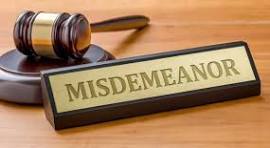
Introduction
In the world of criminal law, not all offenses carry the same weight. While felonies grab headlines due to their severity, misdemeanors are more common and often misunderstood. These are less severe crimes but still carry serious consequences, including fines, probation, community service, or even jail time.
Understanding what constitutes a misdemeanor, the types of misdemeanors, potential punishments, and available defenses is crucial for anyone facing legal challenges or simply seeking knowledge about criminal law. This guide offers a comprehensive overview of misdemeanors to help you understand your rights and options.
What Are Misdemeanors?
Misdemeanors are criminal offenses that are less serious than felonies but more significant than infractions. They generally involve some harm to individuals or property but do not include severe bodily injury or major financial loss.
Key Characteristics
-
Moderate Severity – Less serious than felonies but more than minor infractions.
-
Shorter Jail Time – Typically less than one year in a county or local jail.
-
Fines and Community Service – Common penalties include monetary fines and mandated service.
-
Criminal Record Impact – Convictions remain on records, potentially affecting employment or housing.
Examples include petty theft, minor assault, vandalism, public intoxication, and certain traffic offenses.
Categories of Misdemeanors
Misdemeanors are often classified by severity or the nature of the offense:
1. Class A Misdemeanors
These are the most serious minor offenses:
-
Assault causing minor injuries
-
First-time DUI in some areas
-
Theft of property below a threshold value
Penalties can include up to one year in jail, substantial fines, and probation.
2. Class B Misdemeanors
Examples:
-
Disorderly conduct
-
Possession of small amounts of controlled substances
-
Trespassing
These usually carry shorter sentences and fines.
3. Class C Misdemeanors
The least serious category, including:
-
Traffic violations
-
Minor petty theft
-
Public nuisance offenses
Fines or community service are the most common penalties.
Note: Laws and classifications vary by state. Always consult a local criminal defense lawyer.
Punishments for Minor Crimes
Even minor offenses can have meaningful consequences:
Jail Time
Typically under one year in a local or county jail, depending on the offense.
Fines
Monetary penalties vary by state and the severity of the crime.
Probation
Courts often offer probation, requiring adherence to conditions like check-ins, counseling, or avoiding further offenses.
Community Service
Many minor crimes include mandatory community service hours.
Restitution
Offenders may be ordered to compensate victims for damages or losses.
Driver’s License Suspension
Common in traffic-related offenses or DUIs.
How Misdemeanors Differ From Felonies
| Aspect | Misdemeanors | Felonies |
|---|---|---|
| Severity | Less serious | More severe |
| Jail Time | < 1 year | 1+ years |
| Jail Type | County/Local | State Prison |
| Record Impact | Moderate | Long-term |
| Examples | Petty theft, minor assault | Murder, armed robbery |
Even though misdemeanors are minor crimes, repeated offenses may escalate to felony charges.
Common Defenses Against Misdemeanor Charges
A skilled criminal defense attorney can help explore defenses such as:
-
Mistaken Identity – Eyewitness errors can lead to wrongful accusations.
-
Lack of Intent – Many minor crimes require proof of intent, which may be absent.
-
False Accusation – Personal disputes or misunderstandings can lead to charges.
-
Insufficient Evidence – Prosecutors must prove guilt beyond a reasonable doubt.
-
Violation of Rights – Illegal searches or seizure can invalidate evidence.
Legal Process for Minor Crimes
-
Arrest or Citation – Some misdemeanors allow citations instead of arrest.
-
Arraignment – The defendant hears charges and enters a plea.
-
Pretrial Motions – Lawyers may request dismissal or reduced charges.
-
Trial or Plea Bargain – Many cases are resolved through plea deals.
-
Sentencing – Courts issue penalties if convicted.
Legal guidance early in the process can significantly influence the outcome.
Collateral Consequences
Even minor crimes can have lasting effects:
-
Employment Limitations – Certain jobs may become inaccessible.
-
Housing Restrictions – Renting may be more difficult.
-
Professional Licenses – Criminal records can affect licensing.
-
Immigration Impacts – Non-citizens may face visa or residency issues.
Juvenile Misdemeanors
States often handle juvenile offenses differently:
-
Emphasis on rehabilitation
-
Community service or counseling programs
-
Juvenile detention for serious cases
Juvenile records are often sealed, but legal counsel is still important.
Why Legal Representation Matters
Facing misdemeanors requires professional guidance. A defense lawyer can:
-
Investigate evidence
-
Negotiate plea deals or reduced charges
-
Represent clients in court
-
Advise on mitigating long-term impacts
Even minor charges can affect your future, so legal representation is crucial.
Preventing Minor Crimes
Reduce the risk of misdemeanor charges by:
-
Following laws carefully
-
Avoiding risky behavior
-
Being aware of local ordinances
-
Consulting legal advice if unsure about actions
Conclusion
Misdemeanors may be classified as minor crimes, but they carry real consequences, including fines, jail time, probation, and lasting impacts on your record. Understanding the types of misdemeanors, potential punishments, and legal defenses is critical for anyone facing charges or seeking to protect their rights.
Whether you are dealing with a first-time offense or repeated misdemeanor charges, consulting an experienced criminal defense attorney is essential. They can help navigate the legal system, reduce penalties, and safeguard your future.
By staying informed and seeking proper legal assistance, you can address misdemeanor charges effectively and minimize their impact on your life.




